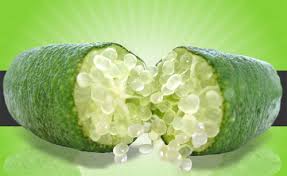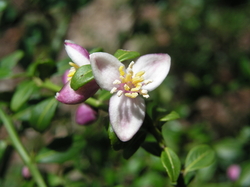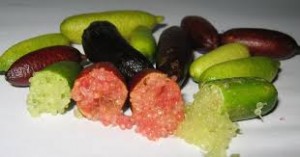Australian Finger Lime, Citrus australasica (syn. Microcitrus australasica)
Cultivation and Uses of Australian Finger Lime,
Early settlers consumed the fruit and retained the trees when clearing for agriculture. Colonial botanists suggested that they should be cultivated.The finger lime has been recently popularised as a gourmet bushfood. The globular juice vesicles have been likened to a “lime caviar “, which can be used as a garnish or added to various recipes. The fresh vesicles have the effect of a burst of effervescent tangy flavour as they are chewed. The fruit juice is acidic and similar to that of a lime. Marmalade and pickles are also made from finger lime. The finger lime peel can be dried and used as a flavouring spice.There is a wide range of different coloured variants of finger lime fruit, including green, yellow, orange, red, purple, black and brown. Finger lime is thought to have the widest range of colour variation within any Citrus species.Commercial use of finger lime fruit started in the mid-1990s in boutique marmalades made from wild harvested fruit. By 2000 the finger lime was being sold in restaurants, including the export of fresh fruit.
The finger lime has been recently grown on a commercial basis in Australia in response to high demand for the fruit. There is an increasing range of genetic selections which are budded onto Citrus rootstock. With the sudden high market demand for the fruit the primary source of genetic material for propagation has been selections from wild stock.In cultivation, the finger lime plant is grown in much the same way as other citrus species. It may be subject to some pests and diseases requiring pest control in cropping situations. This includes scale, caterpillars, gall-wasp, and limb dieback. Research into fruit fly by Dr Andrew Jessop has concluded that Finger Limes are a non-host plant to fruit flies and as such are not a quarantine risk to importing countries.Research conducted in the 1970s indicated that a wild selection of C. australasica was highly resistant to Phytophthora citrophthora root disease, which has resulted in a cross-breeding program with finger lime to develop disease-resistant citrus rootstock.The CSIRO has also developed several Citrus hybrids by crossing the finger lime with standard Citrus species.
A variety of finger lime flesh colours available but the most common are green flesh.
Rarely offered outside Australia.
Limited number of seeds available here.
What you get – 10 very fresh seeds – picked April 2013
Posted promptly after payment is received
Please check your local state and country quarantine restrictions before making a purchase
We have 100% ebay rating http://myworld.ebay.com.au/nimbindarcy?_trksid=p2047675.l2559 So order with confidence.



